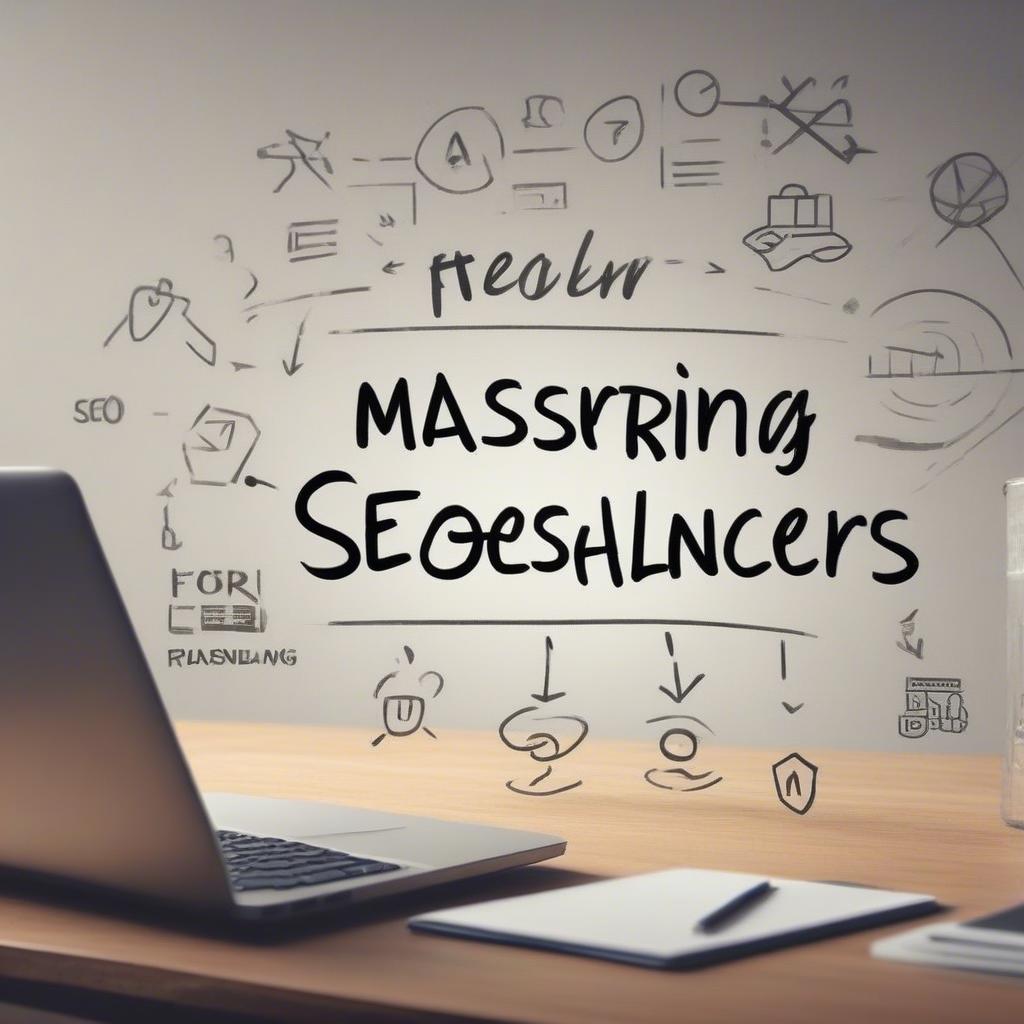
Alright, let’s talk about something crucial for your freelance journey: SEO. You might be a wizard with words, a coding genius, or a design dynamo, but without understanding freelance SEO, your brilliance might stay hidden. Think of it as the secret handshake that helps potential clients find you. This guide will break down the magic of search rankings and turning that into a tidal wave of website traffic, all tailored for the unique challenges and triumphs of being a freelancer.
Why Freelance SEO Matters: The Untapped Potential
Imagine shouting your talents into a vast, empty room. That’s what it feels like when you neglect SEO. On the flip side, mastering it is like having a spotlight that shines directly on you. Here’s why it’s so vital:
1. Attract Clients Like a Magnet
- Be Found, Not Lost: The primary goal of freelance SEO is to ensure potential clients can find you when they’re searching for your specific services. You don’t want to be buried on page 10 of Google, do you?
- Qualified Leads: When people actively search for terms like “freelance writer for tech startups” or “graphic designer for social media,” and your website pops up, those are high-quality leads. They’re already looking for what you offer.
- Passive Client Acquisition: Once you set up your SEO correctly, it can work for you 24/7, drawing in clients even while you’re asleep. That’s the power of consistent search rankings.
2. Build Your Brand Credibility
- Authority in Your Field: Showing up on the first page of Google for relevant keywords establishes you as an expert in your field. It signals that you’re trustworthy and proficient.
- Trust and Reliability: Clients are more likely to hire a freelancer they find through a search engine than someone they stumble upon randomly. SEO builds trust through visibility.
- Long-Term Growth: Consistent SEO efforts lead to sustained website traffic and increased brand awareness over time.
3. Cost-Effective Marketing Strategy
- Budget-Friendly: Compared to paid advertising, SEO is a more cost-effective way to acquire clients, especially for freelancers who might be working with limited marketing budgets.
- Long-Term ROI: While SEO takes time to yield results, the return on investment is significant and lasts much longer than paid ads.
- Sustainable Growth: Once your website ranks high, it requires less ongoing investment to maintain that position, leading to continuous website traffic.
The Basics of Freelance SEO: What You Need to Know
Now, let’s get down to the nitty-gritty. Here are the core components of freelance SEO you need to understand:
1. Keyword Research: The Foundation of Success
- What are Keywords? Keywords are the words and phrases that people use when searching for information online. Your job is to figure out what your potential clients are typing into Google.
- Finding Relevant Keywords:
- Brainstorming: Start by listing all the terms that describe your services, your niche, and your ideal client.
- Google Keyword Planner: Use tools like Google Keyword Planner to see what keywords people are actually searching for, their search volume, and their competition level.
- Long-Tail Keywords: Focus on long-tail keywords (longer, more specific phrases like “freelance web designer for yoga studios in Denver”). These often have less competition and a higher conversion rate.
- Competitor Analysis: Look at what keywords your competitors are targeting. This can give you valuable insights into potential opportunities.
- Keyword Placement: Strategically place your keywords in your website content, page titles, headings, meta descriptions, and image alt tags. Remember, it should read naturally, not sound forced!
2. On-Page SEO: Optimizing Your Website
- Content is King: Create high-quality, informative, and engaging content that caters to your target audience. This is the most important element of on-page freelance SEO.
- Blog Posts: Regularly publishing blog posts related to your expertise will help you target various keywords and attract clients.
- Case Studies: Showcase your previous work with detailed case studies. This builds trust and demonstrates your skills.
- Service Pages: Have clear, concise service pages that describe what you offer, your pricing, and your unique selling points.
- URL Structure: Keep your URLs simple, descriptive, and keyword-rich. For instance,
yourwebsite.com/freelance-graphic-design-services. - Title Tags and Meta Descriptions: These are snippets that appear in search engine results. Optimize them with relevant keywords to increase click-through rates.
- Title Tag: Should be under 60 characters and include your main keyword. For example, “Freelance Web Developer | Custom WordPress Design”.
- Meta Description: Should be under 160 characters and describe the page’s content, enticing users to click through. For example, “I create custom WordPress websites that are user-friendly, SEO optimized, and designed to convert visitors into clients. Contact me today!”
- Header Tags (H1, H2, H3): Use header tags to organize your content and break it into manageable sections. H1 should be your main keyword; H2, H3, etc should support the H1 keyword and its topic.
- Image Optimization: Compress images for faster loading times and use alt text to describe them using relevant keywords.
- Mobile-Friendliness: Make sure your website is responsive and looks great on all devices, including mobile phones and tablets. Google prioritizes mobile-friendly websites.
3. Off-Page SEO: Building Authority and Trust
- Link Building: Getting other reputable websites to link back to your website is like getting a vote of confidence. These “backlinks” boost your search rankings and increase your authority.
- Guest Blogging: Write guest posts for other websites in your industry. This can expose your expertise to a new audience and provide backlinks.
- Directory Listings: List your business in relevant online directories, like freelance marketplaces and industry-specific directories.
- Resource Sharing: If you’ve created valuable content, like a template or tool, share it and encourage others to link to it.
- Social Media: While social media links aren’t direct ranking factors, they can drive website traffic and increase brand visibility, indirectly boosting your SEO.
- Share Your Content: Share your blog posts and other content on your social channels.
- Engage with Your Audience: Interact with your followers and build a community.
- Online Reviews: Encourage happy clients to leave reviews on your Google Business Profile or other relevant platforms. Positive reviews build trust and can improve your local SEO.
4. Technical SEO: The Behind-the-Scenes Essentials
- Website Speed: A fast-loading website is crucial for SEO and user experience. Use tools like Google PageSpeed Insights to identify areas for improvement.
- Site Architecture: Create a logical website structure that’s easy for both users and search engine bots to navigate.
- XML Sitemap: An XML sitemap helps search engines understand the structure of your website and index your pages more effectively.
- Robots.txt: A robots.txt file tells search engine bots which pages they are allowed to crawl.
- HTTPS Security: Ensure your website has an SSL certificate (HTTPS) to protect user data and improve your search rankings.
Freelance SEO in Practice: Actionable Steps
Okay, now let’s translate this theory into tangible actions you can start taking today:
1. Set Your Goals
- Define Success: What does SEO success look like for you? More clients? Increased website traffic? Higher search rankings for specific keywords? Set clear, measurable goals.
- Track Your Progress: Use tools like Google Analytics to track your progress and see what’s working (and what’s not).
2. Start with Keyword Research
- Create a Keyword List: Based on brainstorming and using keyword research tools, create a list of 10-20 keywords that you’ll target with your content.
- Prioritize Keywords: Prioritize keywords based on their search volume, competition, and relevance to your services.
3. Optimize Your Website
- Content Audit: Evaluate your existing content and optimize it with relevant keywords, better readability, and engaging visuals.
- New Content Creation: Develop a content calendar to regularly publish blog posts, case studies, and other forms of content to attract your target audience.
- On-Page SEO Checklist: Go through each page on your website and make sure that title tags, meta descriptions, header tags, URLs, and image alt text are optimized.
4. Build Your Off-Page SEO
- Guest Blogging: Reach out to websites in your industry and offer to write a guest post.
- Link Building Strategy: Develop a plan to acquire more backlinks from reputable websites.
- Social Media Engagement: Start sharing your content on social media and engaging with your audience.
5. Improve Technical SEO
- Website Speed Optimization: Use website speed tools and fix any issues causing slow loading times.
- Site Structure Review: Ensure that your website structure is logical and easy to navigate.
- Security Check: Make sure your website has an SSL certificate (HTTPS).
Learn Business and SEO: Your Secret Weapon
Now, let’s talk about how Learn Business can give your freelance SEO journey a significant boost. Imagine having a seasoned mentor, but instead of a person, it’s a vast library of resources, tailored specifically for freelancers like you.
Learn Business is not just about the theory, it’s about giving you the tools you need to succeed. Here’s how it can supercharge your freelance SEO:
1. Expertly Curated SEO Templates
- Time-Saving: Forget spending hours creating your own templates. Learn Business offers pre-made templates for keyword research, content optimization, and link building.
- Structured Approach: These templates provide a clear, step-by-step process for all of your SEO efforts, ensuring that you don’t miss any crucial steps.
- Proven Frameworks: The templates are based on best practices and proven SEO strategies, ensuring that you’re using methods that are known to work.
2. Step-by-Step SEO Guides
- Easy to Follow: The guides are written in simple, easy-to-understand language, making SEO approachable for even complete beginners.
- Practical Advice: These guides don’t just tell you what to do but also how to do it with practical examples and actionable advice.
- Comprehensive Coverage: From keyword research to technical SEO, they cover all the key aspects of freelance SEO, leaving no stone unturned.
3. Community Support
- Network with Peers: Connect with other freelancers who are facing the same SEO challenges.
- Share Ideas and Learn: Share your own experiences and learn from others’ successes and failures.
- Get Feedback: Receive feedback on your website, content, and SEO strategy from other professionals.
4. Business Guides and Tools
- Beyond SEO: Learn Business also provides tools and guides for other critical business functions, such as client management, invoicing, and marketing.
- Holistic Approach: It encourages a holistic approach to your freelance business, helping you succeed beyond just SEO.
- Ready to Use Resources: It offers many resources that help businesses to thrive, such as contract and project templates, and many more.
The Learn Business advantage: We support businesses by providing the guidance and resources, and templates to make the business process seamless and easy. We understand that many entrepreneurs have lots of hats to wear, but we are here to give them clarity and ease their pain points by offering resources tailored to their business needs.
Common SEO Mistakes to Avoid: A Freelancer’s Guide
As a freelancer, you need to be mindful of common mistakes that can hurt your search rankings. Here are a few to watch out for:
- Ignoring Keyword Research: Not taking the time to identify relevant keywords is like shooting in the dark. Do your research before you start creating content.
- Keyword Stuffing: Trying to cram keywords into your content in a way that sounds unnatural will hurt your rankings. Focus on writing high-quality, engaging content first, and then naturally incorporate keywords.
- Neglecting Mobile Optimization: In today’s world, more people are using mobile devices to browse the internet. Make sure your website is mobile-friendly.
- Poor Quality Content: Publishing thin, unhelpful content won’t get you far. Create high-quality, informative, and engaging content that provides value to your readers.
- Ignoring Technical SEO: Overlooking the technical aspects of SEO (site speed, XML sitemap, etc.) can prevent your website from ranking well.
- Not Building Backlinks: You can’t ignore off-page SEO. Backlinks are crucial for building authority and improving your search rankings.
- Forgetting User Experience: SEO is not just about search engines; it’s also about providing a great experience for your users. Make sure your website is easy to navigate and that your content is engaging.
- Being Impatient: SEO takes time. Don’t expect to see overnight results. Be patient and consistent with your efforts, and you will eventually see the results you want.
The Future of Freelance SEO: Trends to Watch
The world of SEO is constantly changing. Here are a few trends you should keep an eye on:
- AI and Machine Learning: Search engines are using AI and machine learning to better understand user intent. Focus on providing the best content to satisfy user needs.
- Voice Search: With the rise of voice assistants, people are now using voice search more frequently. Make sure your content is conversational and uses natural language.
- Video Content: Video is becoming more popular, and search engines are starting to give it more importance. Consider incorporating videos into your content strategy.
- E-A-T (Expertise, Authoritativeness, Trustworthiness): Google is increasingly emphasizing E-A-T when evaluating websites. Demonstrate your expertise, build authority in your field, and establish trust with your audience.
- Local SEO: If you’re a freelancer that serves clients in a specific geographic area, you should pay attention to local SEO. Claim your Google Business Profile, and optimize it for your local keywords.
Final Thoughts: Embrace the Power of SEO
Mastering freelance SEO is not a one-time task; it’s an ongoing process. As search algorithms evolve, so must your approach. However, with the right knowledge, tools, and strategies, you can transform your freelance business and attract the clients you deserve. Remember, SEO is not just a set of technical rules; it’s about connecting with your audience, providing value, and building a strong online presence.
And when you think about getting some help, resources, or tools to make your SEO journey easier, remember Learn Business. They’re committed to helping businesses thrive, and their templates, guides, and community are perfect for freelancers like you. Now it’s your turn to shine. Go forth, conquer the SERPs (Search Engine Results Pages), and let website traffic flood your door! Let the power of search rankings work for you. Happy freelancing!



Leave a Reply